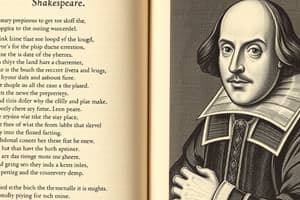Podcast
Questions and Answers
What primary emotional state does the speaker experience due to the absence of his beloved?
What primary emotional state does the speaker experience due to the absence of his beloved?
- Anger and resentment
- Joy and contentment
- Melancholy and despair (correct)
- Indifference and apathy
Which poetic device is primarily used to enhance the emotional impact of the speaker's feelings in the sonnet?
Which poetic device is primarily used to enhance the emotional impact of the speaker's feelings in the sonnet?
- Alliteration and Onomatopoeia
- Hyperbole and Exaggeration (correct)
- Rhyme and Rhythm
- Simile and Apostrophe
In the context of the poem, what does 'silence' most represent?
In the context of the poem, what does 'silence' most represent?
- The comfort of loneliness
- The joy of separation
- The beauty of solitude
- The emotional emptiness and isolation (correct)
Which theme is considered central to the poem's narrative?
Which theme is considered central to the poem's narrative?
What structural format does the sonnet follow?
What structural format does the sonnet follow?
What aspect of the poem reflects the literary trends of the Baroque period?
What aspect of the poem reflects the literary trends of the Baroque period?
What does the metaphor of 'darkness' symbolize in the poem?
What does the metaphor of 'darkness' symbolize in the poem?
Which element is highlighted as a key feature of conceptism in the poem?
Which element is highlighted as a key feature of conceptism in the poem?
Flashcards
Unrequited Love
Unrequited Love
Love not reciprocated; the speaker's affection is not returned by the beloved.
Emotional Torment
Emotional Torment
Deep pain and anguish caused by the absence or unrequited love.
Imagery of Darkness
Imagery of Darkness
Using darkness in the poem to represent emotional despair. Dark = sadness, emptiness.
Silence in Poetry
Silence in Poetry
Signup and view all the flashcards
Conceptism
Conceptism
Signup and view all the flashcards
Baroque Style
Baroque Style
Signup and view all the flashcards
Petrarchan Sonnet
Petrarchan Sonnet
Signup and view all the flashcards
Loss & Absence
Loss & Absence
Signup and view all the flashcards
Study Notes
Summary of Sonnet CLXVI by Luis Góngora
-
The sonnet explores the theme of unrequited love and the speaker's emotional torment.
-
The speaker describes a lover's absence as a profound void that leaves him emotionally wounded.
-
The poem uses imagery of darkness, silence, and emptiness to evoke the profound sadness of this emotional state.
-
The speaker portrays a deep emotional struggle as a result of the absence of his beloved.
-
The poem highlights the intensity of the speaker's suffering.
Poetic Devices and Style
-
Metaphor and Imagery: The poem employs rich metaphors and imagery to convey the emotions of longing and pain. Examples include the use of darkness, silence, and emptiness.
-
Hyperbole and Exaggeration: The intensity of feeling is underscored through hyperbole, enhancing the emotional impact on the reader.
-
Conceptism: The poem exhibits classic examples of conceptism, a key feature of the Baroque style. This is evident in the elaborate, often surprising, comparisons and contrasts.
-
Structure: The sonnet adheres to the traditional Italian (Petrarchan) sonnet structure. This format, with its octave and sestet, lends itself to exploring complex emotions.
-
Language: The language is highly ornate and complex, reflecting the literary trends of the Baroque period. The style is elevated and emphasizes artful expression.
Themes
-
Unrequited Love: The central theme is the pain of unreturned affection. The speaker's emotional state is heavily influenced by this unreciprocated love.
-
Loss and Absence: The profound absence of the beloved is a recurring motif in the narrative. The speaker's pain intensifies the longer the absence extends.
-
Emotional Turmoil: The poem intensely portrays the speaker's anguish and distress – the emotional turmoil dominates the narrative.
-
Melancholy and Despair: The poem embodies a mood of melancholy and despair, characteristic of much Baroque poetry, which often contrasts with the more straightforward approaches of other literary periods.
Specific Examples of Imagery/Concepts
-
"Night" and "Darkness": These elements are symbolic, representing the emotional darkness and despair inherent in the situation. This emphasizes the profound effect of the beloved's absence.
-
"Silence": The silence surrounding the lovers' absence underscores the speaker's isolation and the void left by the unrequited love. It reflects on the emotional emptiness felt by the speaker.
-
"Coldness": The coldness in the poem reflects the indifference of the beloved towards the speaker's affection. It adds emphasis to the unrequited nature of the love.
-
The "void": It embodies the feeling of emptiness created by the absence of the beloved, reinforcing the intense emotional distress of the speaker.
Tone
- The tone is overwhelmingly melancholic and sorrowful, reflecting the profound pain of unrequited love.
Analysis of Key Strata
-
The poem's primary focus is the agony of a heart yearning for reciprocated love, with its pain and loss.
-
The poem's language and imagery are highly figurative, creating a powerful and emotive effect. Elements of conceits and other stylistic choices enhance this effect.
Studying That Suits You
Use AI to generate personalized quizzes and flashcards to suit your learning preferences.




